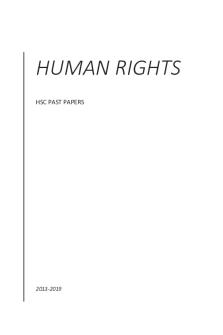Tutorial VII - European Convention on Human Rights PDF

| Title | Tutorial VII - European Convention on Human Rights |
|---|---|
| Course | PUBLIC LAW 1 - CONSTITUTIONAL LAW |
| Institution | University of Surrey |
| Pages | 1 |
| File Size | 42.6 KB |
| File Type | |
| Total Downloads | 19 |
| Total Views | 115 |
Summary
European Convention on Human Rights...
Description
Tutorial VII 1. Malone v Metropolitan Police Commissioner 1979-Malone accused govt of authorising police tapping on his telephone without legal authority. H was accused of handling stolen goods and police said tapping his phone was necessary/ Brought action against police seeking declaration that phone tapping was unlawful. Said it was done contrary to Article 8 of ECHR (right to privacy). Held: court refused to grant declaration. -Declaration could only be made on matters of English law, not international law. At time, ECHR was not part of English law and court was firmly applying dualist approach between domestic and international law, respecting doctrine of separation of powers. -Malone took case to ECtHR who decided lack of legislative regulation on phone tapping breached Article 8 rights (Malone v UK 1984)-Malone was correct in legal argument but not domestically. P enacted Interception of Communications Act 1985, putting phone taping on a more comprehensive statutory footing. 2. The Human Rights Act 1988 protects the ECHR rights in three main ways: -It allows members of the public to seek justice in British Courts because it incorporates the rights set out in the ECHR into domestic British law. -It requires all public bodies e.g. courts, police, local authorities, hospitals and publicly funded schools etc to respect and protect your human rights. -In practise it means that Parliament will nearly always make sure that new laws are compatible with the rights set out in the ECHR (although ultimately P is supreme and can pass laws which are incompatible). The courts will also, where possible, interpret laws in ways which are compatible with Convention rights. -The Bill of Rights may give a greater national ‘margin of appreciation’ in how the rights are applied in a domestic context that the HRA. 3. PS is not diminished by the ECHR due the idea of dualism. However, the HRA does not limit PS as it was the Blair govt who introduced it in 1997 voluntarily. It is also in the hands of the politicians themselves how they interact with human rights. An example is that case of Hirst v UK 2005- prisoner voting rights. UK were told they were breaching article 3 of ECHR which says that everyone has the right to free elections. P has taken more than 5 years to implement the law and it was still not completed. ECtHR gave the UK maximum of 6 months to implement the legislation but the UK had still not done so....
Similar Free PDFs

Human Rights
- 167 Pages

Human- Rights- Resources 2018
- 5 Pages

Human Rights Assignment 1
- 3 Pages

Human rights- Article 9
- 31 Pages

MCQ human rights
- 27 Pages

Ontario Human Rights Code
- 36 Pages

CSR - Zara - Human Rights
- 4 Pages

HSC Legal - Human Rights
- 13 Pages

Human Rights HSC Notes
- 10 Pages

Human Rights and IR
- 1 Pages

Human Rights Question Papers
- 15 Pages

Human Rights Law notes
- 76 Pages

Past Papers Human Rights
- 14 Pages
Popular Institutions
- Tinajero National High School - Annex
- Politeknik Caltex Riau
- Yokohama City University
- SGT University
- University of Al-Qadisiyah
- Divine Word College of Vigan
- Techniek College Rotterdam
- Universidade de Santiago
- Universiti Teknologi MARA Cawangan Johor Kampus Pasir Gudang
- Poltekkes Kemenkes Yogyakarta
- Baguio City National High School
- Colegio san marcos
- preparatoria uno
- Centro de Bachillerato Tecnológico Industrial y de Servicios No. 107
- Dalian Maritime University
- Quang Trung Secondary School
- Colegio Tecnológico en Informática
- Corporación Regional de Educación Superior
- Grupo CEDVA
- Dar Al Uloom University
- Centro de Estudios Preuniversitarios de la Universidad Nacional de Ingeniería
- 上智大学
- Aakash International School, Nuna Majara
- San Felipe Neri Catholic School
- Kang Chiao International School - New Taipei City
- Misamis Occidental National High School
- Institución Educativa Escuela Normal Juan Ladrilleros
- Kolehiyo ng Pantukan
- Batanes State College
- Instituto Continental
- Sekolah Menengah Kejuruan Kesehatan Kaltara (Tarakan)
- Colegio de La Inmaculada Concepcion - Cebu


